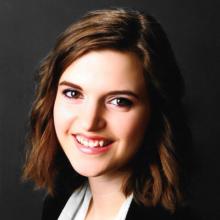Samantha Baglot
Why did you decide to pursue a graduate degree?
I volunteered and worked over multiple summers in a research laboratory during my undergraduate degree. Additionally, I completed a directed studies project during my 4th year that exposed me to learning and troubleshooting a new analysis technique and helping write a manuscript. In doing so, I gained a passion for neuroscience research. I enjoy that each day poses a new set of challenges and that I am always gaining new knowledge. Further, I love that I have the opportunity to participate in multiple tasks including: research, writing, reading, mentoring, and teaching.
Why did you decide to study at UBC?
I completed my undergraduate degree at UBC and really enjoyed my time at this university. Further, as an undergraduate I volunteered in two research laboratories and became integrated with the members of both of them, involved with the ongoing projects, and passionate about what each lab studies. I joined the graduate program with the goal of being co-supervised to bring the expertise from both these labs together. Lastly, I love Vancouver as a city and enjoy doing many outdoor activities (hiking, biking, skiing) and have formed many close friendships here.
What is it specifically, that your program offers, that attracted you?
The research of my two supervisors is ultimately what attracted me to the program.
What was the best surprise about UBC or life in Vancouver?
The close friendships and amazing support I have received from my fellow lab members and graduate students.
What aspect of your graduate program do you enjoy the most or are looking forward to with the greatest curiosity?
I enjoy the diversity in the tasks that I do on a weekly basis. I have had the opportunity to not only do research (including running experiments, reading, and writing), but also collaborate with other lab members, mentor undergraduate students, be a teaching assistant, work on neuroscience outreach events in my position on the neuroscience graduate student association, and volunteer with other UBC recruitment events.
What do you see as your biggest challenge(s) in your future career?
I would like to be a primary investigator as I really enjoy research, mentorship, and teaching. However, the prospects of getting a job as a PI at a prominent Canadian university are simply (currently) not the best.
I gained a passion for neuroscience research. I enjoy that each day poses a new set of challenges and that I am always gaining new knowledge. Further, I love that I have the opportunity to participate in multiple tasks including: research, writing, reading, mentoring, and teaching.
How do you feel your program is preparing you for those challenges?
The program does provide job fairs and information nights around finding a job following a post-doc position. Furthermore, my supervisors provide opportunities to practice mentorship and teaching skills, as well as help write/edit grant applications.
What aspects of your life or career before now have best prepared you for your UBC graduate program?
I practiced and taught Martial Arts for over 13 years - which really provided me the opportunity to learn valuable mentorship skills, as well as how to work collaboratively in a team environment. Furthermore, volunteering in research laboratories during my undergraduate provided the opportunity to witness and learn from graduate students in the program I intended to enter. Lastly, as an undergraduate student I participated in UBC's student directed seminar program - where as a 4th year student I proposed and facilitated and university course based on a topic that UBC does not offer. I completed all the necessary course preparation including making a syllabus, individual class plans, reading list, course assignments, and marking rubrics; further, I facilitated two classes a week for an entire semester.
What do you like to do for fun or relaxation?
I enjoy exercising (hiking and biking, as well as yoga) and hanging out with my friends (we are usually going to events or having a games nights).
What advice do you have for new graduate students?
Learning to manage your time well will be your biggest strength in graduate studies.
